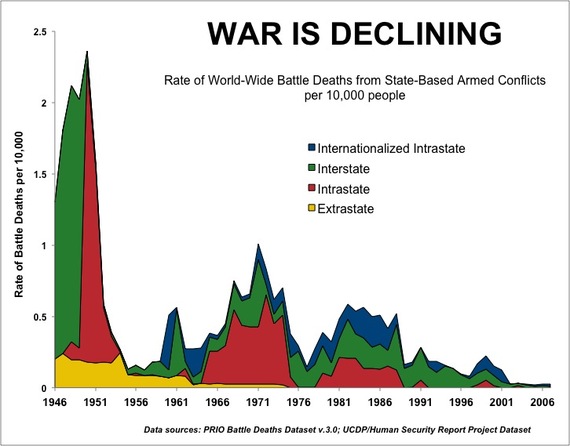In the wake of wars, rape, domestic violence, and other terrible realities of our day, I agree that it may seem "illogical or even obscene" to suggest that we, as a species, have become less violent over time. But if myth reflects society, as was argued by Joseph Campbell, we have to look no further than the evolution of Santa Claus for evidence of our gentling.
The original St. Nicholas became a patron saint of children because of two stories in which he rescues children: the first from prostitution and the other from murder. From 1200-1400, the saint was honored by rewarding "good" children with gifts on his day in early December, which later shifted in some places to a focus on Baby Jesus and his birthday, and eventually to the incarnation Americans recognize as "Jolly Ole St. Nick". What many may not realize is that for most of this history (in fact, until even the last generation in some parts of Europe), the Santa myth was as violent as it was festive.
In Germany and Austria, St. Nicolas' visit was proceeded by the terrifying Krampus -- this demonic creature with horns and fangs was said to whip and kidnap misbehaving children. Although he is making a comeback as an excuse to party on December 6, gone are the days of widespread belief in the "Christmas Devil". Similar disciplinarians included La Père Fouettard (The Whipping Father) in France, and Belsnickel in other parts of Europe.
In the Netherlands, the Santa figure has traditionally been accompanied by the Zwarte Pieten, men with dark skin whose job was to whip and kidnap children to "bring them back to Spain", since these escorts were based on the traumatic memories of the Moorish invasion of Europe. However, in more recent years, they are simply Santa's helpers, and there is much discussion concerning the racist overtones of the tradition.
Children were threatened with whipping and kidnapping in Spain by Papa Noel, and in Iceland, children had to fear Yule Lads or Yulemen and even a Yule Cat, who were said to kidnap and eat children at night. Both myths have evolved into tamer versions; with the Yulemen having become benevolent or simply mischievous.
To be sure, corporal punishment generally is fading out of favor and is illegal in many places including 31 nations, as are other types mistreatment of children such as forcing them into labor. But is this gentling trend generalizable to the rest of the population? The best metric to track this over time is arguably the ultimate form of violence: homicide including war. In his revolutionary book The Better Angels of our Nature: Why Violence has Declined, Dr. Stephen Pinker, professor of psychology at Harvard, presents evidence that the likelihood that a person meets their end at the hands of another has decreased dramatically with each century of the modern era. Although the size of war has increased, its frequency has dramatically decreased, as well as the number of deaths relative to population sizes.
In fact, our perceptions of war and other types of violence have undergone a complete revolution. Even considering the atrocities of WWII, there has been a shift from widespread belief that violence and war are inevitable and even desirable to the idea that they are immoral and preventable. According to the book, "The Arc of War" by Levy and Thomson (2011), we are currently experiencing the longest stretch of peace, as defined by the absence of war between superpowers, that our planet has ever known.
The trend of decline in violence is especially clear if we consider all of human history. During early civilization, sacrificing children and other innocents (e.g. virgins, widows) was widespread across religions and continents. Long after this practice was abandoned, it was still common practice for community leaders to sentence individuals to death as heretics or witches, with flimsy or absurd "evidence". These murders were acceptable in most cultures for literally millennia. Not only was it okay to burn, flog, or otherwise torture someone to death for a victimless crime or no crime at all, but the public would actively witness such events without flinching, even as their ears were filled with screams of pain. For most of human history, children were considered property of their parents, who could torture, mutilate, murder, or sell them without risk of reprimand.
And yet, within the span of only the last couple hundred years, these horrors became considered barbaric. Within less than a century even a public hanging as a legitimate punishment became unthinkable, much less a public spectacle, in developed nations. As Pinker points out, it is difficult to fathom how a dramatic a change our species has undergone, especially recently.
An increase in peacefulness is a reality worth acknowledging and studying, especially if by doing so, we might increase its presence throughout the planet. Perhaps we can now consider maximizing peace, rather than just minimizing war, as argued in a 2014 article in the journal Conflict, Security & Development. As stated in the Human Security Report 2013: The Decline in Global Violence (Simon Frasier University, Canada), "... there are now compelling reasons for believing that the historical decline in violence is both real and remarkably large -- and also that the future may well be less violent than the past." Indeed, a year after PewResearch findings about declining support for the Iraq war , a poll conducted last summer by YouGov suggests that Americans have become reluctant to engage the military in new conflicts.
